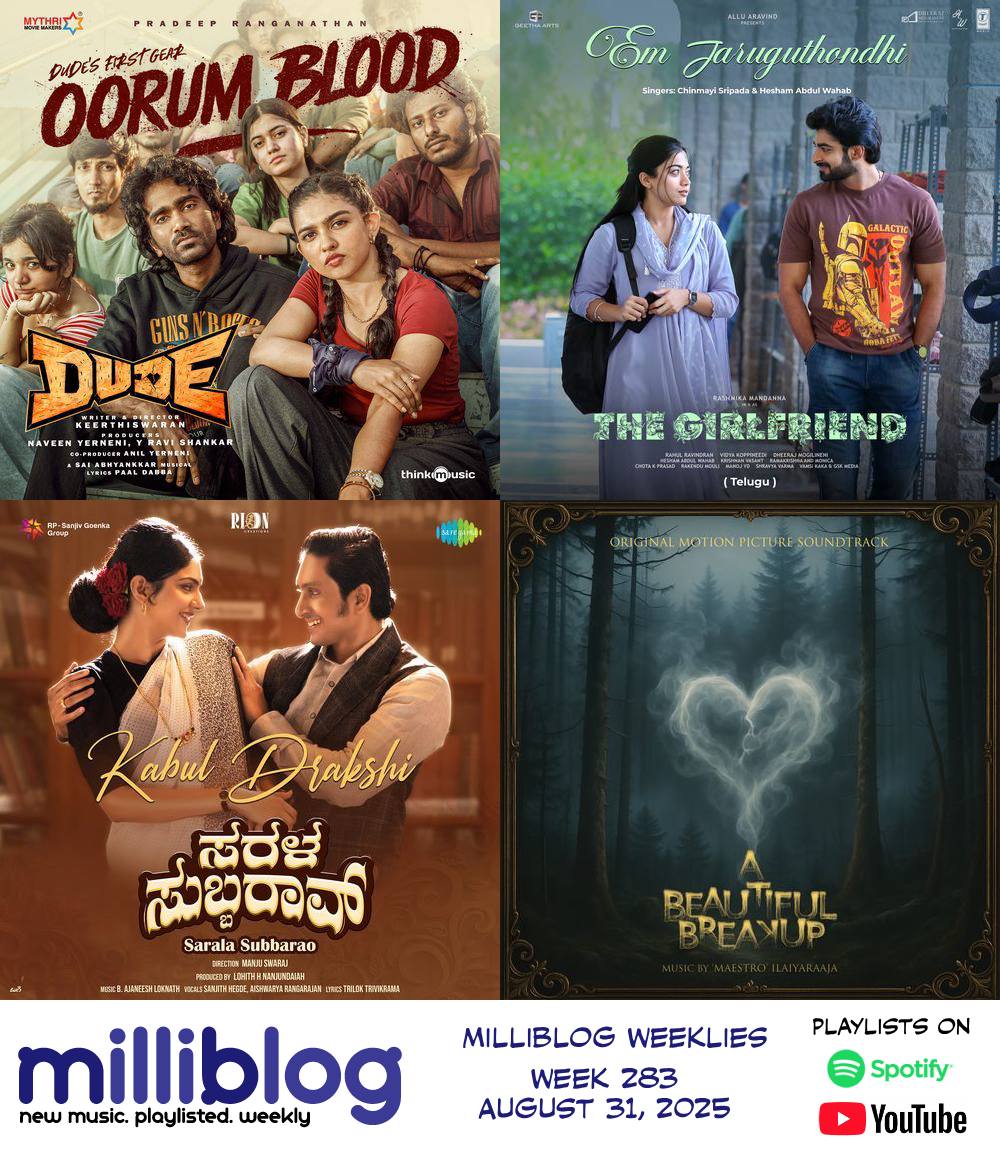Milliblog Weeklies – India’s only multilingual, weekly, new music playlist.
Week 283: YouTube | Spotify
A bumper musical week with 21 songs!
Tu Pehli Tu Aakhri – The Ba***ds Of Bollywood (Shashwat Sachdev) – Hindi: Shashwat produces a considerably better second single from Aryan’s debut show (than Anirudh’s first single, last week, which, while sounding generally decent, was also largely generic)! The common link, though, is Arijit Singh’s magnificent vocals, which is employed to even better effect in a searing pathos melody like this one. I really liked the lower base antara than even the mukhda.
Dil Parinda – Ufff Yeh Siyapaa (A R Rahman) – Hindi: The opening line felt like Rahman was going out of his way concocting something completely fresh… a bit too contrived. The tune goes with the film’s tone – zany and whimsical, but Rahman reigns in the choas in the tune after the opening, and does a surprisingly good job with his own singing, offering a subtle nod to older Hindi songs.
Oorum Blood – Dude (Sai Abhyankkar) – Tamil: I remember loving the first musical piece released for Dude early this year, and it’s good to hear Sai build his entire song around that catchy piece of music. The ‘Dude’ callout in the end of the first line did make me feel that Sai was trying too hard, like another instance from Balti, below. But overall, this is a vibrant song with a lot of interesting smaller bits, much like Sithira Puthiri, that gradually make cohesive sense with repeated listens. That’s an interesting pattern borrowed from Rahman’s playbook!
Unadhu Enadhu, Thangapoovey – Madharaasi (Anirudh) – Tamil: Unadhu Enadhu has a simple, predictable melody not really befitting Anirudh’s imagination, but Shilpa Rao’s vocals make it a solid listen. And the interludes (including the outro) really make the song more interesting than the actual tune, with a surprising and very nice Carnatic classical twist! Thangapoovey belongs to the list of songs that started with Lelse Lewis’s Suneeta Rao sung ‘Paree Hoon Main’ (1991), then A R Rahman’s Ratchagan song, ‘Chandiranai Thottathu Yaar’ (1997), among others. But even as the melody and rhythm remind you of those older songs almost instantly, Anirudh’s tune is captivating enough to deserve a listen, thanks largely to Ravi G’s singing too, who also tries to sing a bit like Anirudh 🙂
Idhu Devadhai Nerame – Kumaara Sambavam (Achu Rajamani) – Tamil: If you listen only to the song’s first interlude, you may instantly recognize it as a Gopi Sundar song! But Achu has a likeable tune in the opening even beyond the Gopi influence. Haricharan Sheshadri and Saindhavi are great choices for this melody.
Em Jaruguthondhi – The Girlfriend (Hesham Abdul Wahab) – Telugu: What a fantastic song! Sure, it screams ‘Hesham’ in the way the tune flows, but because he has a female lead singer (Chinmayi), it sounds fresh and different from his usual tunes. And Chinmayi does a smashing job handling the melody wonderfully punctuated by Sumesh Parameshwar’s plucky guitar. The musical conversation between Hesham (“Em Jaruguthondhi”) and Chinmayi (“Manasa, Telusa…”) is particularly incredibly alluring.
Suvvi Suvvi – They Call Him OG (Thaman S) – Telugu: While the pallavi has every bit of Thaman’s signature, with a strong echo to Rahman’s Kannathil Muthamittaal classic, ‘Oru Dheivam Thantha Poove’, right upto the ‘Suvvi Suvvi’ hook, it is what happens after that, in terms of the interlude that leads to the anupallavi that Thaman does an outstanding job, invoking Ilayaraja’s orchestral flourish. Sruthi Ranjani’s singing is remarkably good and the melody too has a wonderful tranquility to it, with Thaman’s usual semi-classical touch.
Pretty Pretty – Beauty (Vijay Bulganin) – Telugu: Vijay has a gorgeous melody layered along with Abin Sagar’s genial guitar. And in PVNS Rohit’s singing, the song just breezes effortlessly.
Oh Megham – Meghalu Cheppina Prema Katha (Justin Prabhakaran) – Telugu: The other song from the film’s soundtrack that clicked, mainly because of the choice of singer matched perfectly with Justin’s melody – Gowtham Bharadwaj.
Naalo Nenu – Couple Friendly (Aditya Ravindran) – Telugu: The kind of song where I perk up and wonder who the composer is! And it turns out to be singer Aditya Ravindran! The song has a sparse, but assured feel, in terms of the backgrounds, with the tune taking center stage. Sanjith Hegde is excellent, as usual (and Aditya sings the Tamil version himself), but it is Aditya’s beautifully minimal sound that easily wins here.
Jaalakaari – Balti (Sai Abhyankkar‬) – Malayalam: I guess this is Sai Abhyankkar‬’s actual film composing debut, as in his first released film song. It falls on the lines of what you would expect from Sai, based on his previously released non-film songs… and some more. But I did find the openign line’s flow to be a bit too contrived, as if Sai is trying hard to concoct something completely different, much like the opening line of Rahman’s ‘Dil Parinda’, above. It is interesting and makes for a good listen too, but the freshness that was apparent in his early two pop songs seems missing.
Manamohini – Odum Kuthira Chaadum Kuthira (Justin Varghese) – Malayalam: The only other song that stood out for me (besides Duppattawaali) in the soundtrack by Justin. The song has a pleasant techno vibe that Justin uses well to land the ‘Manamohini’ hook, and has excellent singing by Ajay Jameson, and in particular, Ramya Nambessan.
Welcome To Mollywood – Maine Pyar Kiya (Electronic Kili) – Malayalam: A zany mish-mash of a song that seems to be riffing on OP Nayyar’s Leke Pahla Pahla Pyar (CID, 1956), but takes on newer patterns too, on its own. Electronic Kili’s music continues to surprise and excite me!
Kabul Drakshi – Sarala Subbarao (B Ajaneesh Loknath) – Kannada: After ‘Rangoli‘, back in May, Ajaneesh delivers another winner from the film! Sanjith Hegde and Aishwarya Rangarajan do a superb job in handling the flamboyant, retro-style tune with a steady beat.
Oora Paaka Poren – Vijaynarain (Tamil/Indipop): Super Subu’s enjoyably imaginative lines like ‘Oda kooda oda poren’ and ‘Kaadu undu SIM card illa’ frequent this gentle, nostalgic yearning for a simpler life composed with a lot of heart by Vijaynarain. Aditya Ravindran, who has his own song down this list, plays guitar here.
Sol – Sid Sriram (Tamil/Indipop): While I found the lead melody of Sol to be pretty conventional, I really liked the way Sid built the music behind the tune. It gets progressively more interesting in the anupallavi, after a faux-interlude of sorts.
Love Theme – A Ballad Of Love, Whispers Of Desire, and Rhythm of the 9Yards – A Beautiful Breakup (Ilayaraja) – Instrumental: Overall, the soundtrack of A Beautiful Breakup seems like a 2025 redux Idhayam’s (1991) background score! There are specific call-backs to that film’s mesmerizing score peppered all through multiple songs. ‘Love Theme – A Ballad Of Love’ is the one that has the most prominent recall and is a delightful listen. In Whispers Of Desire, Raja tries something new, producing what seems like a combination of sound produced through a flute and coarse vocal whistling, almost like giving life to a whisper, but without words. It is enveloped in some vibrant backgrounds. Rhythm of the 9Yards is my favorite in the album, and is absolutely stunning, harking back to several of Raja’s evergreen melodies from movies including Mazhai Varuthu (Raja Kaiya Vecha) and Indraikku Yen Indha (Vaidehi KaathirundhaaL), among others. I presume the reason could the raaga – Bagesri (the former) or Abhogi (the latter). But Raja’s imagination to score a melody to/around the 9 yards saree is hugely imaginative and richly rewarding!
Run with SA – Strings Attached (Indipop/Instrumental): The album ‘Run with SA’ is a consistently good listen already, but the title song is the best! The musical couple, Kumaresh Rajagopalan on Violin, and Dr. Jayanthi Kumaresh on Veena, offer a highly engaging conversation between the two instruments even as the melody sounds almost as fresh as a pop song by Sai Abhyankkar! Some of the sound excerpts did take me to Rahman’s prelude to the Puthiya Mugham number, ‘July Maadham Vandhaal’.





